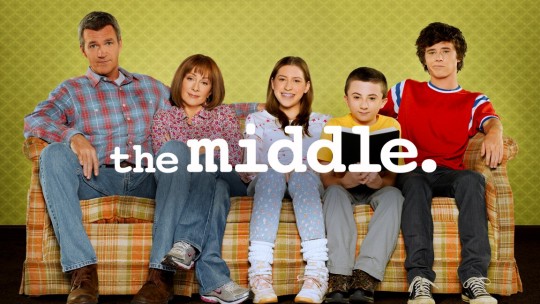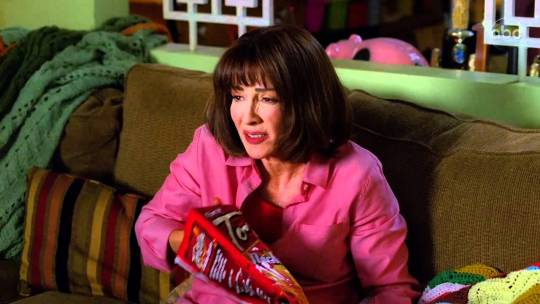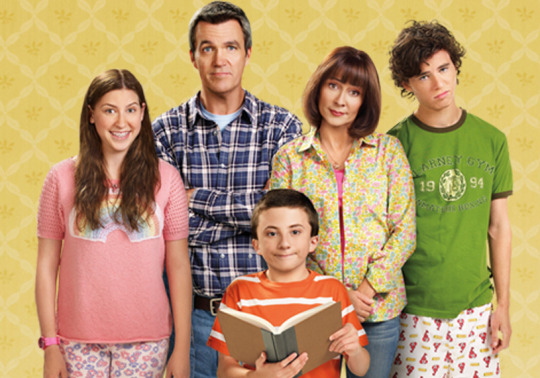Hi! My name is Paige Wucherpfennig and I am 19 years old. I'm from Glastonbury, Connecticut however, I am currently attending school at Syracuse University. I'm studying information technologies and business management.
Don't wanna be here? Send us removal request.
Text
What it’s Actually Like to be Stuck in the Middle
”Wouldn’t it be nice to live in a family that puts their dirty dishes in the sink rather than on the back of the toilet.”

Frankie from “The Middle” is a working-class mother who loves her family but struggles with managing the time bind of work and home, with the added challenge of not having enough money to purchase simple items many take for granted. She serves as the family Chief Mediator, as she tries to maintain a responsible budget and keep the peace in the household.
Frankie works as a used car salesperson and barely has enough gas to get to and from work every day. She must work all day and then come home to fulfill her motherly duties to her three children - Axl, Sue and Brick. In her role as head of the family finances, she always tries to make ends meet, yet isn’t afraid to let her family know when they don’t. Because Frankie must devote most of her time generating income to support the family, it often negatively impacts her ability to be the traditional “mom” her children need.
Throughout history, women have been stereotyped as the sole caregivers of children and the home. Although more recently, roles and perceptions of the caregiver are changing, women still make up the majority of stay-at-home parents.
Frankie has difficulties maintaining “work-life balance”, as worker and mom, a common theme for many working families. Frankie constantly brings home fast food after her work shift, and the family rarely eats a home cooked meal together.
In one episode, Frankie’s Aunt passed away, and family members and friends began to bring food to the Heck’s house. Frankie informed her family that “people are bringing food into the house because you’re not supposed to cook when you’re sad”, and to that her youngest son Brick responded, “Does that mean you’re sad everyday Mom?” Frankie hasn’t cooked a homemade meal in a long time, leaving her kids to believe fast food is a normal nightly dinner or, even worse, that perhaps the reason Frankie doesn’t cook is because really is depressed.

This demonstrates the challenge for working mothers to manage both time spent at home and time spent at work generating income to support a family. This also eludes to the fact that healthy fresh fruits and vegetables from a grocery store are much more expensive than fast food. It’s very hard for working mothers today to buy fresh foods, as doing so would not fit into the limited budgets many families have.
Frankie is consistently faced with the difficult decision to stay at work and neglect the home or stay at home where she is not getting paid. She often chooses her paying job, neglecting her motherly duties, because without her paycheck, the family would be very financially unstable. In every episode, Frankie is forced to make personal sacrifices to ensure her family can continue to live in the home.
Furthermore, Frankie and her family make frequent references to the dishwasher not functioning properly. In one episode, Frankie states, “The dishwasher’s getting worse; I think it’s actually putting food onto the plates.” Frankie even goes as far to begin taping up the dishwasher with duct tape to stop it from leaking. The repeating theme of the broken dishwasher throughout the episodes is representative of the common hardships of a working-class family, which many people fail to recognize. Most Americans are in the working class and problems, such as a dishwasher breaking, which may seem like minor inconveniences to some, are quite significant. More fortunate people often take for granted things like a working dishwasher. This is exemplary of the divide between the “haves” and the “have not’s” in our society, and the struggles of the working class today.
Many people who aren’t in the working class believe that working class families should just “work harder” to move up the social class hierarchy, however, realistically, this is very hard to do. “The Middle” depicts a family coping with the day-to-day challenges of the working class rather than focusing on Frankie and the family trying to improve their social standing.
Although the family is tight on money, in episode one, Frankie decides to take the family on a vacation. The kids weren’t thrilled when they found out they would be going camping in the woods, however, Frankie tells them that “any motel they could afford would have more bugs than the outdoors anyways.” Rather than letting their financial standing get her down, Frankie makes the best of the money they do have to bring the family together.
Many things, such as a vacation, can cost significant sums of money, making them out of reach for many working-class families. It’s almost as if society is structured to support only the top 5 to 10% of the wealthiest citizens. Most families, like the Heck’s, don’t have a vacation option besides camping, as everything is far too expensive in our country.
The term “family” to most people represents the typical nuclear family - one father, one mother and two to three children. This is exactly the family structure of the Heck’s; however, they don’t quite live up to people’s perceptions of a “normal” family. The qualities of a family that most people value are supportive parents, well behaved children and stability.
The Heck’s already lack stability with their financial situation. Adding to this, the family doesn’t always behave as we’d expect of a picture-perfect family. In one episode, the family was being attacked by a bear. Instead of banding together and working through the situation, the family began to fight, which quickly escalated the situation and put them in more danger. Axl, Sue and Brick began to call each other names followed by Frankie referring to her children as “helpless” in a time of crisis.
The images of family harmony associated with this family type can be difficult to live up to, as it’s impossible for any family to be perfect. Frankie demonstrates the difficulty in conforming to the norms and expectation of a perfect mother.
Finally, the show’s name, “The Middle”, describes the circumstances of the family it depicts. The title represents a middle class, two working parents, living in a very small town in middle America. Most of the wealth in this country is concentrated in places like New York and Los Angeles, coastal “book ends” of the country. People generally don’t associate the middle of the country with money, especially for a small town like the one in which the Heck’s live. However, many American families live similarly to the Heck’s, and “The Middle” lightly but warmly satirizes the lifestyle and circumstances of this social class.

0 notes
Text
Hi! I’m from Glastonbury, Connecticut.
Glastonbury, Connecticut: A rich, conceited suburb from Hartford, CT. There are two people who are not white in the entire town. Everyone owns a nice, brand new car at age 15 (before they can drive, so they can break it in), and they all have swimming pools filled with fifties. Their high school is six times the normal size (just because it can be), and they have 12,000 sports teams (because everyone plays a sport or they’re nobody).
That right there is what Urban Dictionary thinks of my small, small Connecticut suburb. It’s slightly painful to read, however I’ll be the first to admit that it’s partially true. The one thing they got wrong is the population of non-white people in my town. This is where my story comes in.
When I moved to Glastonbury many years ago, we moved into a neighborhood of mainly Indian families. Growing up, I thought nothing of it, as I would constantly play with the other neighborhood kids. Not until I was much older did I discover what people thought about my neighborhood. Kids at school would refer to my street, Paxton Way, as “Pakistani Way”. These same kids would also make nasty remarks about the families living around me. When I entered high school, I could clearly distinguish the group of kids supporting this racism.
This past year, one family in my neighborhood asked me to babysit their kids every day after school, and I graciously said yes. The Ramnath family had two children, Aria and Arjun, whom I’d known since they were just infants. As I was going into my senior year, Aria was ten years old, and Arjun was six. I was very excited to babysit them, because I knew they were great kids. However, after I said yes, I began to question what the kids at school would think of me.
One day during the first week of school, a bunch of kids were huddled up and chatting in my sociology class. As I approached and listened, I could tell they were talking about jobs.
“I got a job at Panera this year!”, said one student.
Another student was “working at the car shop”, and another was “becoming a tutor”.
When I sat down, I felt the attention of eyes burning into my skin. Suddenly, my legs were shaking, and my face felt flushed. “ Please don’t ask me” I thought.
“Where are you working this year, Paige?”
“Uhm” I stuttered, “I'm babysitting a family in my neighborhood this year.”
I wanted to run out of the classroom and hide forever. I knew exactly what was coming my way. As soon as I told the others in the room about my job, the remarks started flying. Some sat in the back and snickered, while others decided to say it right to my face. Several kids referred to me as the “Pakistani Way Queen” and said they couldn’t wait until I started smelling like curry. I was so hurt, but I didn’t know how to react. As a single, cold tear emerged from my eye, I asked to go to the restroom. When I got back to the classroom, I sat in the back and slouched way down in my chair, hoping nobody would look my way.
For the rest of the day, I laid low and barely talked to anyone besides my best friends. After my sociology class, word spread fast, and it only got worse from there. Kids laughed at me and yelled racist remarks throughout the hallways. The lunch room that day felt like a battlefield - hundreds against one. When the last school bell finally rang, after what felt like weeks, I avoided everyone to the best of my ability and quickly drove home.
When I arrived home, I burst into tears. I wouldn’t allow myself to break at school, but as soon as I got home it all came out, and all I could think was “Should I quit this job?” Although I loved Aria and Arjun, what had happened to me at school really hurt. I decided I would babysit that day and see how everything went, because at that point, I was very embarrassed and hurt.
As 3 o’clock rolled around, I got myself together, fixed my hair and makeup and walked over to the Ramnath house. There was a still a pit in the bottom of my stomach, and I couldn’t shake my uneasiness. Nevertheless, I walked into the house with a smile on my face.
Aria and Arjun would be home any minute from the school bus. I walked into the kitchen to find a note on the counter. Next to the note was an assortment of Indian candies - something I always enjoyed when I was invited over to the Ramnath house. The note said:
Dear Paige,
Thank you so much for being our babysitter this year! Aria and Arjun could not be more excited to spend their afternoons with you. They have been talking about it for weeks now! You are truly a role model to these two. Please help yourself to these candies and thanks again!
Sincerely, Mrs. Ramnath
A tear fell from my right eye, but this time not from fear. The Ramnath family were some of the kindest people I had ever met. This family did not deserve any kind of hate. I became angry with myself at that moment thinking about what had happened in school that day. I’d let myself shut down, when I should have stood up for the Ramnath family. Race or ethnicity mean nothing when considering a person’s character. The Ramnath’s Indian ethnicity did not make them terrorists or curry-eaters. They were people, just like you and me.
At that moment, I vowed to myself that I would begin to stand up for the Ramnath’s at school. I no longer cared what nasty remarks would be thrown my way, and was not afraid to be associated with the family. In fact, I was grateful to the Ramnath family for sharing their Indian culture with me.
Suddenly, the door swung open and in ran Aria and Arjun. As soon as I saw them, I gave each of them a huge embrace. A smile was plastered on my face from ear to ear. A final tear dripped from the corner of my eye, that time out of happiness.
0 notes